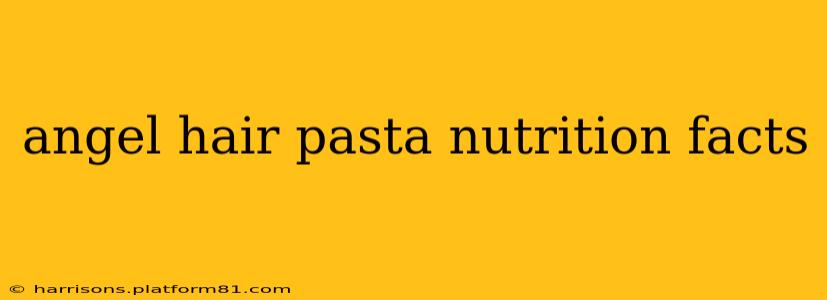Angel hair pasta, with its delicate strands and quick cooking time, is a popular choice for many dishes. But what exactly are the nutritional facts behind this thin pasta? This comprehensive guide delves into the nutritional profile of angel hair pasta, addressing common questions and concerns. We'll explore its calorie content, macronutrient breakdown, and potential health implications, helping you make informed decisions about incorporating it into your diet.
What are the calories in angel hair pasta?
The calorie count in angel hair pasta varies depending on the serving size and whether it's enriched or whole wheat. A typical one-cup serving of cooked angel hair pasta (dry weight approximately ½ cup) contains roughly 200-220 calories. However, this can fluctuate based on the brand and specific ingredients used in its production. Adding sauces, oils, or other ingredients will significantly increase the overall calorie count of your dish.
How much protein is in angel hair pasta?
Angel hair pasta is a relatively good source of protein, offering approximately 7-8 grams of protein per cup of cooked pasta. This amount isn't exceptionally high compared to other protein sources, but it contributes to your daily protein intake. Choosing enriched pasta will ensure a higher protein content than using a plain, unenriched version.
Is angel hair pasta a good source of fiber?
Unfortunately, regular angel hair pasta isn't a particularly significant source of dietary fiber. A one-cup serving typically provides only about 2-3 grams of fiber. To increase your fiber intake, consider opting for whole wheat angel hair pasta, which will boast a considerably higher fiber content, contributing to better digestive health.
What are the carbohydrates in angel hair pasta?
Angel hair pasta is predominantly composed of carbohydrates, mainly in the form of starch. A one-cup serving contains approximately 40-45 grams of carbohydrates. While carbohydrates are essential for energy, it's crucial to consume them in moderation as part of a balanced diet. The glycemic index (GI) of angel hair pasta is moderate, meaning it doesn't cause a rapid spike in blood sugar levels compared to some other refined carbohydrates.
Does angel hair pasta contain fat?
Angel hair pasta itself contains a relatively low amount of fat, usually less than 1 gram per cup. However, the fat content increases significantly when you add sauces, oils, or butter during preparation. Therefore, mindful cooking methods are crucial to maintain a lower fat content in your angel hair pasta dishes.
What are the vitamins and minerals in angel hair pasta?
Enriched angel hair pasta provides small amounts of several essential vitamins and minerals, including iron, thiamin (vitamin B1), riboflavin (vitamin B2), and niacin (vitamin B3). These additions are often included during the processing of the pasta to improve its nutritional profile. The actual amounts can vary based on the brand and enrichment process.
Is angel hair pasta gluten-free?
No, regular angel hair pasta is not gluten-free as it is made from wheat. Individuals with celiac disease or gluten sensitivity should avoid regular angel hair pasta. However, gluten-free versions are readily available in most supermarkets, often made from alternative flours like rice or corn. Always check the packaging for ingredients and allergen information.
What are some healthy ways to prepare angel hair pasta?
Preparing angel hair pasta in healthy ways is key to maximizing its nutritional benefits. Opt for lighter sauces like pesto (made with less oil), marinara (low sodium), or lemon-garlic sauce. Incorporate plenty of vegetables to increase the nutritional value and fiber content of your meal. Avoid excessive amounts of butter, oil, or cheese to keep the fat content lower. Consider using whole wheat angel hair pasta whenever possible to increase your fiber and nutrient intake.
This detailed analysis of angel hair pasta's nutrition facts provides a comprehensive understanding of its nutritional composition and implications for your health. Remember that incorporating any food into your diet should always be part of a balanced and varied eating plan. Consult a registered dietitian or nutritionist for personalized dietary advice tailored to your specific needs and health goals.
